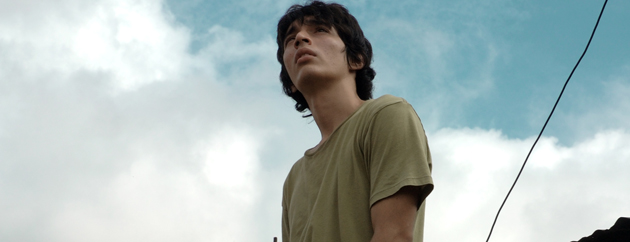
Hermano
01 March, 2012Against a culture of drugs, crime, delinquency, violence, poverty and random acts of meanness, what hope is there? We follow the eponymous hermanos, Daniel and Julio, in a lottery where the chances are slim.
Hermano starts with a mestizo woman and a small boy climbing a footbridge over a busy road. The boy hears a noise which he takes to be el gato, a cat. He lets go of his mother’s hand and runs to investigate. In the rubbish-strewn no-man’s-land that flanks the bridge, an abandoned mestizo baby cries. There, lying à la Moses, is Daniel, el gato, who is soon to be the foil for the small boy, Julio, in the fight for dignity and redemption. The mother looks, then begins to walk away. She can’t. Like each of the characters in this film she is put to the test.
Caracas’ barrios are the “original sin” of slums; you are born into them and you usually spend a brief and often violent lifetime trying to atone for it. This is a Sisyphean tale with and without the resignation. Here is rubbish in reality and metaphor – with hope, talent and humanity acting as the transcendent forces.
The narrative resumes 16 years later when Daniel (now nicknamed El Gato) is playing with his brother, Julio (aka Poker), for La Ceniza, the local barrio team, against rivals La Vega for a place in the cup final and, perhaps, bigger things. In the crowd is a scout from Caracas FC. On a scrubby pitch adjoining the strangely beautiful geometric composition of the barrio the boys fight to earn a ticket out.
Through the auspices of Roberto, a former football pro, and sometime lover of their mother Graciela (Marcela Girón) the boys negotiate a line between the duality of their footballing dream and the reality of life in the barrio. Julio is already in the orbit of the local drug baron, Morocho (Beto Benites), and works as a repoman. In contrast, Daniel, is unworldly, something of a dreamer, who like his mother, aspires to something better.
Daniel is interested in Sol (Leany Leal) but is too immature to have a girlfriend. Sol, who is little more than a child herself, later becomes pregnant and Daniel, though not the father, goes with her to the abortion clinic and persuades her not to go through with it. His decision is no doubt informed by his own particular and fortuitous reprieve from a similarly hopeless fate. Her appreciation of him is bittersweet. Decisions have repercussions and poverty is an unremitting, depressing and destructive master.
Eventually, after some violent scuffles which serve to underline the cheapness of life in the barrio, Julio and Daniel, both talented footballers, get their chance with Caracas FC. They both perform well but Julio leaves early because Daniel continues to withhold what he knows of the details of some dodgy scrapes he’s involved in. Daniel is offered a contract but he will only sign if Julio, too, is offered one. Rather melodramatically, the management of Caracas FC listen as Daniel predicates the award of the contract on the boys’ performance against Petare (another barrio) in the cup final.
Fernando Moreno (Daniel/El Gato), Eliú Amar (Julio) and Ali Rondon (Max) put in reasonable performances but the character of Roberto (Gonzalo Cubero), the coach or Profe, is the only one that is really fleshed out. The film saves itself from falling into cheap sentimentality by killing off some major characters but you can’t help feeling that poverty doesn’t merely reside with individual choices.
If you live in a jungle, wildness tends to be a by-product. It is fine to be hopeful and to promote self-help, indeed, without it we are less than human, but the real route out of poverty, whilst sometimes sporting – is always political.
Some of this political help comes from UNICEF who have been screening the film to spur conversations about violence prevention in Venezuela’s poor urban communities. There is also a detailed Sounds and Colours article on Venezuela’s slums here.
Hermano is showing as part of ¡Viva! festival 2012 at Cornerhouse, Machester. See cornerhouse.org/viva2011 for screenings.
Follow Sounds and Colours: Facebook / Twitter / Instagram / Mixcloud / Soundcloud / Bandcamp
Subscribe to the Sounds and Colours Newsletter for regular updates, news and competitions bringing the best of Latin American culture direct to your Inbox.

